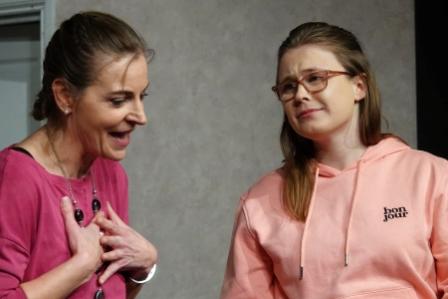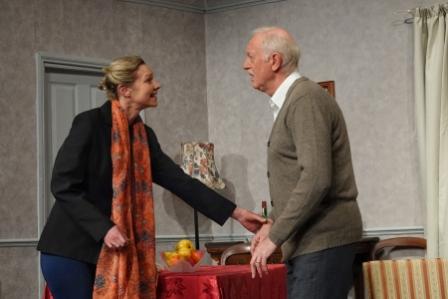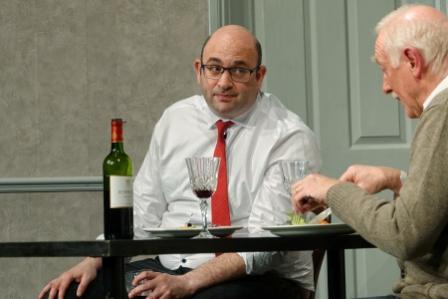|
|
||||||||||||||||||||||||||||||||||||||||||||||||||||||||||||||||||||||||||||||||
Click
here for more pictures of this play
The Father |
||||||||||||||||||||||||||||||||||||||||||||||||||||||||||||||||||||||||||||||||
|
||||||||||||||||||||||||||||||||||||||||||||||||||||||||||||||||||||||||||||||||
|
Some plays are much more than just an entertainment, some provoke, educate and inform. The Father was so clearly in this camp. It was a play I was glad to have seen and the insights into the father’s world were compelling and made me reflect on a condition I know little about. As a piece of theatre this was no easy production to bring to an audience. From the programme notes we knew we were in for a confused and disorientated experience. Although the film prepared me for the ninety minutes, that emotional connection with the live performance always trumps film in my experience. Direction Jean Cooper’s vision for this production must have been informed from her seeing the professional production in 2015 and possibly the 2020 film version. Jean’s good director’s notes in the programme provided the audience with some insights into her approach and objectives for this piece; involving the audience; disorientating the audience; making them mistrust their perceptions and interpretations of what they were seeing. Bold ambitions for sure but largely met for those willing to commit and stay engaged. The challenge of taking the audience through a play without the normal time and plot constructs was well achieved and although the audience needed to be prepared to work a little, their journey was rewarded by gaining insights into the effects of dementia. Generally, the positioning of the actors was simple without much movement. On a few occasions André was positioned down stage right with Anne and sometimes Laura upstaging him but all coped well and André made himself heard and seen. There were a few scenes set behind the table and sofa which was okay but with the stage extension in place I wasn’t sure why this wasn’t used to bring the characters more down stage. Even when André looked out of his bedroom window onto the Paris street, he did so from the curtain line. It seemed a shame not to bring the actors to the audience a little more and use the extension. Set and Staging The large room transitioned through various stages via the mind of André. The simplicity of the furnishings became explained and the clever change of picture, lampstand and chairs gave the audience something tangible to signify either the actual change of location or the perceived one. The sadness of the one chair and sofa appeared as an illustration of André losing many things from his mind. The changes were quick and surprising and the cast being discovered on each scene added pace and immediacy. Page 2 The transition to the sparse room, the ‘home’ and then the institutional hospital was a clever piece of set design, a round of applause to Garry Cooper. Cast André Andrew Rogers gave another outstanding performance. He enveloped this character totally and brought an emotional attachment to André that the audience needed to develop the empathy for him. From the mislaying of his watch to the mislaying of his watch, Andrew ensured that André was an engaging central component of this complex play. The physicality of André was most notable, with the stance, the slight limp in the walk and the pointing at anyone and everyone. The hand gestures emphasised the opinions he made and the forcefulness of his voice made him appear a strong, healthy elderly man in body if not in mind. He had pace and some energy and was able to manage on his own with ‘use of his arms, legs and hands’. He was not frail in body and this contrasted well with his poor mental health. On many occasions André was actually the most animated of the characters. The voice tone was forceful and loud when needed to be. The London accent was more reminiscent of the ex-engineer than the tap-dancing circus conjurer and grounded him in his past. He appeared early on to be a convivial elderly fellow even if he had manged to get through a few carers including poor Isobel. André’s aggression to Laura was uncomfortable ‘speaking as if I was retarded’ as was his crying like a bullied child when the Man slaps him. This solid foundation of the physical and vocal parts of the character then enabled the contrasts in memory and mind to be demonstrated so explicitly. The panic and anxiety in voice and mood when confused by the chicken was disturbing as was his fictional past which we began to believe and André thought was reality. The line repetition of someone struggling to find words and memory was also well portrayed. The mental chore to comprehend who’s flat he was in, his concern and worry about Anne’s wellbeing and the perception that it’s the others that suffer from memory loss was full of tragedy. André was truly mortified to think he would be discovered in his pyjamas and we felt his pain when he was all alone in Paris. So, what of André? Does he progress, change or deteriorate through the course of the play? What is his reality and what is perceived by him? With so much to contemplate the play relies heavily on a strong André to carry the ninety minutes. Andrew Rogers did just that, a tremendous feat from an actor at the top of his game. A fine performance, well done. Anne As the character on the receiving end of André’s pointy finger and cruel comparisons with sister Elise, Anne’s domestic troubles are a large aspect of this play. Emma Middleton navigated the trials of Anne with clarity and compassion. It was testing for the audience to establish what was real and what was in André’s head. Had Anne actually met a man? Was she actually going to London? Emma made it clear that she was the victim of much emotional blackmail and unwelcome advice adding the pressure to her life. Page 3 Anne’s conversation on the telephone was very believable with tricky repeated half lines, not always easy to pull off. Anne’s monologue scene was delivered with care and direction and apart from the selected movements, Emma remained wonderfully still throughout which emphasised the demonstration of the hands around the neck. A fine disciplined and chilling scene. The single spot light also added to the intensity. Anne was always trying to find a way forward and persuade André to move home. Her disappointment and frustration to the lack of progress was well portrayed and made Anne very believable. I thought I saw Anne appear to get tired and warn down as the play went on, as if the situation was getting too oppressive. Maybe there was an opportunity to deepen the characterisation for Anne a little. The frustrated but controlled woman was possibly a little two dimensional. A little more colour and complexity to the character may have added another layer but excuse me for wanting everything, this really was a fine performance. Man Some well-developed cameos from Adam Rabinowitz aided the questions of who is whom and what is what? As Pierre, the height contrast between Adam and Andrew worked well when both were down stage. Andrew is not a small man but with Adam a few inches higher, Andre looked dwarfed and vulnerable. This was built upon when André gets slapped, a scene that received an audible reaction from the audience and was uncomfortable to witness. Adam could have been stiller up stage behind the sofa and had a tendency to move feet and shoulders for no apparent reason, just something to watch out for. Woman Sophie Gilbert gave us a different Anne, although helpfully in same black jacket and scarf. It was her entrance and first scene that started the disorientation of the play for me. Later as Laura, Sophie managed to be threatening and rather intimidating with just a few lines indicating that this was probably in André’s mind. It was a significant scene that helped the audience ascertain what was happening. Then Martine in nurses’ whites brought us to the hospital and the emotional ending. Martine, the kind, smiling, comforting nurse with the embrace and "you’ll be alright". Lovely cameos throughout from Sophie. Laura The carer looking for a new career dressed in jeans and hoodie was well portrayed by Lizzie Clare. She was almost ‘too good to be true’ with kind words and a generous interest in André. The strange giggling laughter enabled the Father to show a nasty side with the sarcastic rebuff. Lizzie’s set up and humiliated reaction to this was played well. Pierre Jon Gilbert was well cast as Pierre and fitted into the domestic scenes with ease. Offering hugs from sitting down and suggesting unwanted solutions was not untypical of a man not prepared to try too hard. At times I would have liked Jon to have picked up on his cues a little quicker as his pace didn’t always match that of the others. Pierre’s aggression to André was clear as his frustration moved towards anger. Anyone who had to cancel his Corsican holiday had a right to feel angry. Page 4 Sound and Lighting So, to the blinding light effect. It was interesting to watch the audience members reaction to it. On the first use a few people shielded their eyes or looked away, by the umpteenth use almost everyone did so. It became annoying fairly quickly. We got the point of using the effect early on, that it was to disorientate, confuse, make us uncomfortable but this was then laboured well over the acceptable mark. Could the effect have been used more sparingly? Perhaps stage left and right alternating, or just turn it off. The rig also looked ugly and out of place. Sorry not for me, nice try but this one didn’t work. The accompanying music was well chosen with frenetic frantic pieces of Paganini styling. Although slightly too loud for the number of times used (I missed the last few words of Anne’s important monologue) the pieces helped the disorientation between each scene. The contrast of the final soothing strings was evident and rather a relief. Costumes All well designed and collected. Andre’s look was very comfortable in Cardigan and slippers. He looked sad in his big black coat and tweed cap, as if he had been moved out of his home unwillingly. Summary This was not an easy show to watch but the cast and director worked hard to keep the audience engaged. I applaud you for including The Father in your season and for the fine performances from a talented cast. I suspect the support given to Dementia UK and EFDAA was far more than just the funds raised through the sale of the programmes. I suspect the play’s powerful impact left many of us understanding this condition considerably more. |
||||||||||||||||||||||||||||||||||||||||||||||||||||||||||||||||||||||||||||||||




